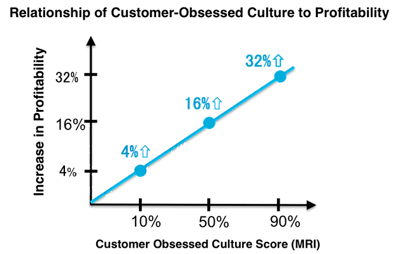Company culture is something that is being increasingly highlighted as a crucial element of a business strategy, and our research shows that getting it wrong can be an expensive mistake.
However, each business is different and will need to adopt a specific type of culture to suit the industry, business goals and strategy. Our blog explains the four main types of company culture and where you may find them in the business world - and among these four types is the notorious market culture.
Let's explore this model in more depth: what defines market culture, and what are its pros and cons?
What is market culture?
The most aggressive of the four common types of culture, market culture is what it says on the tin. It's results-driven, market-orientated and extremely competitive.
This type of culture is most common in larger, more corporate-minded businesses, where leaders are relentless, tough and have very high expectations of their teams. Employees are given difficult goals that they strive to achieve. Performance is closely monitored, for which it’s not unusual for employees to be rewarded and punished. Simply put, 'getting the job done' and meeting targets is the number one priority.
The polar opposite of clan culture, in market culture stability is key and the focus never strays from penetrating the market, beating competitors and taking ownership of the market share.
Think Amazon’s Jeff Bezos or the late Steve Jobs – these are prime examples of market culture leaders.
What is a characteristic of a market culture?
Generally, characteristics of a market culture include a focus on results, hitting targets & individualism - encouraging employees to be independent & self-reliant.
The pros of adopting a market culture
Despite the aggressive nature of market culture, there is no doubt that it has its up-sides for business productivity and growth. Here are some examples of the advantages that adopting this type of organisational culture can bring.
Maximised profit
Naturally, with a culture that is solely customer, results and success orientated comes a higher revenue. Goals are met, or if they aren’t, new ways are explored to reach them.
Additionally, employees who are consistently motivated and pushed to achieve big results are more likely to generate a bigger income than those who aren’t.
According to US strategy consultants MarketCulture, there is an evident correlation between how much a company is ‘obsessed with their customers’ and their profitability (graph below).

Always one step ahead
With competitors in mind, a business with a market culture would be dedicated to market research and staying on the ball with daily trends and goings-on within their industry. This way they’re always ready to react to any changes in the market to ensure they maintain the market share and stay ahead of the game.
Driven and ambitious employees
In a market culture, employees are consistently pushed to go the extra mile and are driven and inspired by their leaders, resulting in team members who are constantly focussed on building on their skills and knowledge.
The cons of market culture
A dent in the bank
One of the biggest characteristics of a market culture is the need to stay in tune with the surrounding market and industry, in order to stay in the know with any changes so they can be reacted to. In order for this to happen, the business will need to fork out a significant amount for market research… and this can be an expensive requirement.
Burnout
Team members who are being constantly pushed to achieve results in a fast-paced environment can often become over-worked, meaning their wellbeing takes a back seat. This can often result in cases of presenteeism, or in severe cases poor mental health and employee burnout - not just bad news for productivity and team morale, but your bottom line, too.
Toxic atmospheres
With a highly competitive working environment, employees who are up against each other can often adopt a dishonest (and therefore unproductive) way of working. This is definitely one to watch out for as it could have gut-wrenching consequences for your team’s productivity levels, fluidity and morale. You might also face difficulty in your team collaborating and working together smoothly on important projects.
.webp)
Author: Sarah Benstead
Sarah is a Product Marketing Specialist here at Breathe. Always innovating, she loves writing about product releases in an engaging & informative way. When she's not coming up with new ideas, she enjoys long walks with her dog, Clifford.






